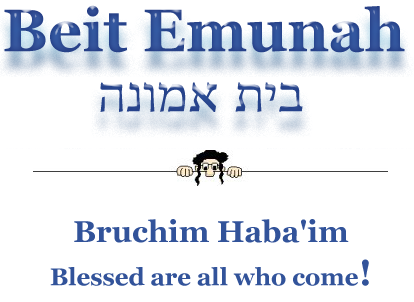| |||||||||||

By Rabbi Shlomo Nachman ben Ya'akov © May 23, 2020
Our Dvar Torah: The Birkat Kohanim – the Priestly Blessings.
We now turn to Rebbe Nachman's Likutey Moharan, Book I # 34:3b and 7:d-8B. I will be reading from Saba Israel's Odesser translation.
In Parsha Naso we learn the Birkat Kohanim – the Priestly Blessings. Torah places great power on prayers and blessings. While it is true that only HaShem can bless, it also true that those who love and serve Him are empowered to serve as His Emissaries. As Jews we are each empowered to serve as the nation of priests. Priests pray and bless, and sometimes withhold their blessings when needed.
At Likutey Moharan lesson I 34 Rebbe Nachman reveals an important aspect of blessing. Blessing is a form of prayer, only with more authority and power. While we should pray for everyone regardless of their situation, we should not indiscriminately bless.
When we bless, as when we pray, we do so verbally. Rebbe Nachman asks, then answers his own question:
Why do we need to pray? Doesn't G-d know our thoughts? Of course He does! However prayers and blessings are vessels of influx. Through them we ask the Holy One to fill some lacking 'cup' by His Will and Mercy. Through blessing another we specifically add our own merits into this equation. It is as though we say: 'If I have merited any favor in Your eyes through service, please apply that merit to this person or situation.
While we pray for all people, we withhold our blessings until they are appropriate. There may be a politician for instance who abuses power. While we would want to pray for him or her to make the right decisions, we may not want to bless them in their current state.
With our lips we create a suitable vessel for our prayers and blessings and, once filled, we present these before the Beloved, asking for His intervention.
“Hence,” our Rebbe says, “a person must speak with his Maker” in order to shine the beam of his creative or rectification light, or personal will power, in order to reveal the issue and promote the needed resolution. Hence the texts say, 'My mouth will speak wisdom' into the thoughts of my heart with understanding'. Such thoughts, prayers and blessings may then properly be presented before the Holy One for action.
When we pray for and bless one another we all find divine mercy and grow into ever greater levels of devekut.
The Cohenim pray for and bless Israel, empowering the Jews to pray for and bless the Noahidim and others, which in turn empowers them to bless the world through their Covenant and commitment to be the caretakers of terrestrial life. In this way all of can humanity can work together towards the realization that HaShem's Name become One and His Kingdom One.
“May HaShem bless you and protect you."
Our sages explain this means "May HaShem bless you with wealth and financial security so that your soul will be free to flourish and do His will. May your wealth produce freedom for your spiritual pursuits.
“May HaShem protect you" means from all fear, damages and harm that might cause your soul to shrivel and not flourish. G-d forbid. A malnourished body leads to a malnourished soul that is incapable of serving HaShem properly. Both of these blessings are therefore equally important.
And "May HaShem shine His Face upon you and be gracious to you."
Having been granted physical well-being, may HaShem grant you spiritual well being. May the spiritual energies of the Torah shine upon you and illuminate your consciousness. May the life path espoused by Torah guide you in all of your ways, eliminating all hatred and disputes so that your life may be filled with Shalom, with Peace. May a healthy body and mind, imbued with the Light of Torah and empowered by Emunah prepare you, with the next benediction, so that, "HaShem might lift His Face to shine upon you and may He grant you Shalom."
We pray HaShem's blessings on everyone for Shalom and well being. For those He presents before us and inspired us to bless we bestow our blessings.
Traditionally overseeing these prayers and these blessings are Cohanim, the priests of the Jewish people. To them is given an additional authority as stated verse 27, where we read in the Gutnick Chumash: (The Cohanim) should use my (explicit) Name (when blessing) the children of Israel, and I will fulfill their blessings.
While we should all pray for one another, we can have emunah that the prayers and blessings of the tzadikim are specially authorized and well received by our King and Master.
Yivarechecha Adonai viyishmirecha
Ya'er Adonai panav elecha veechuneka
Yeesa Adonai panav elecha viyasem lecha
shalom

Let us know
And
Don't let the perfect defeat the good
|
|||
| search engine by freefind |